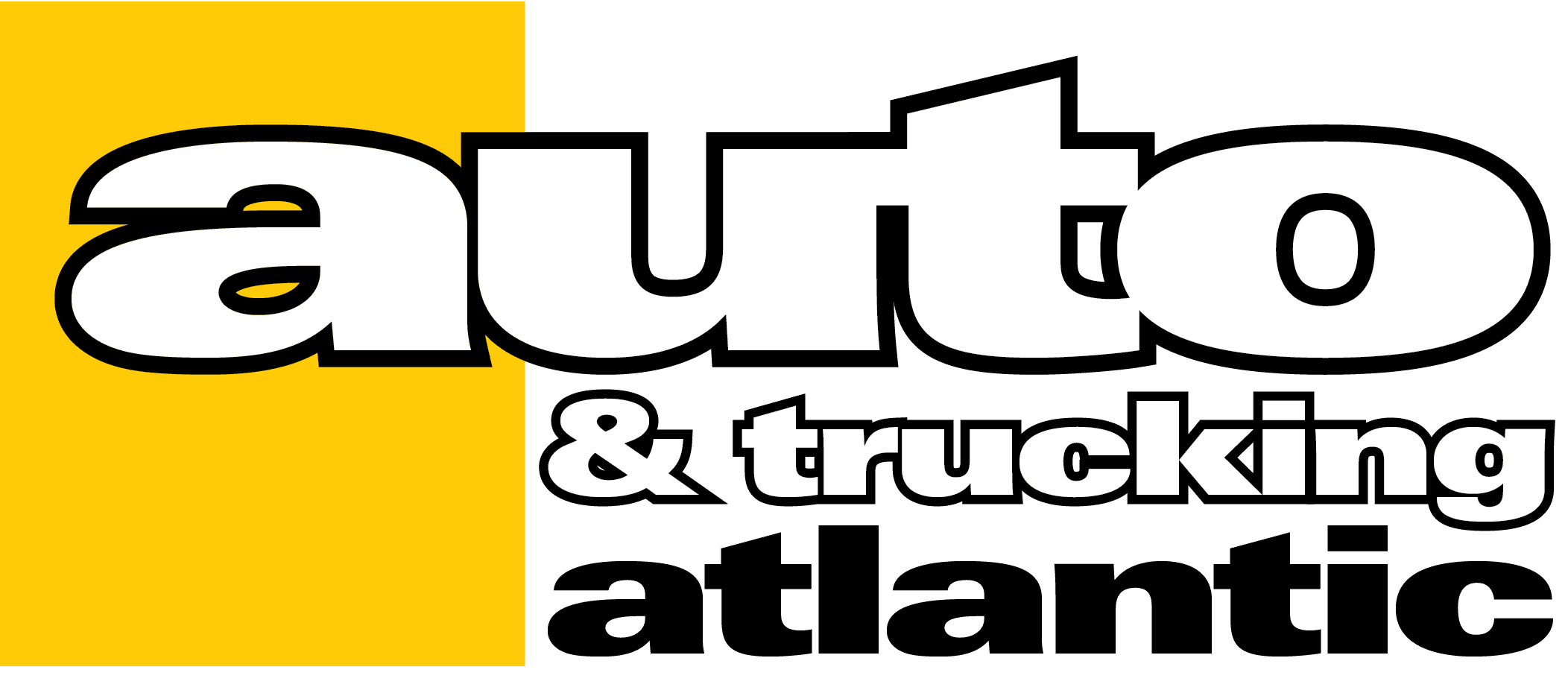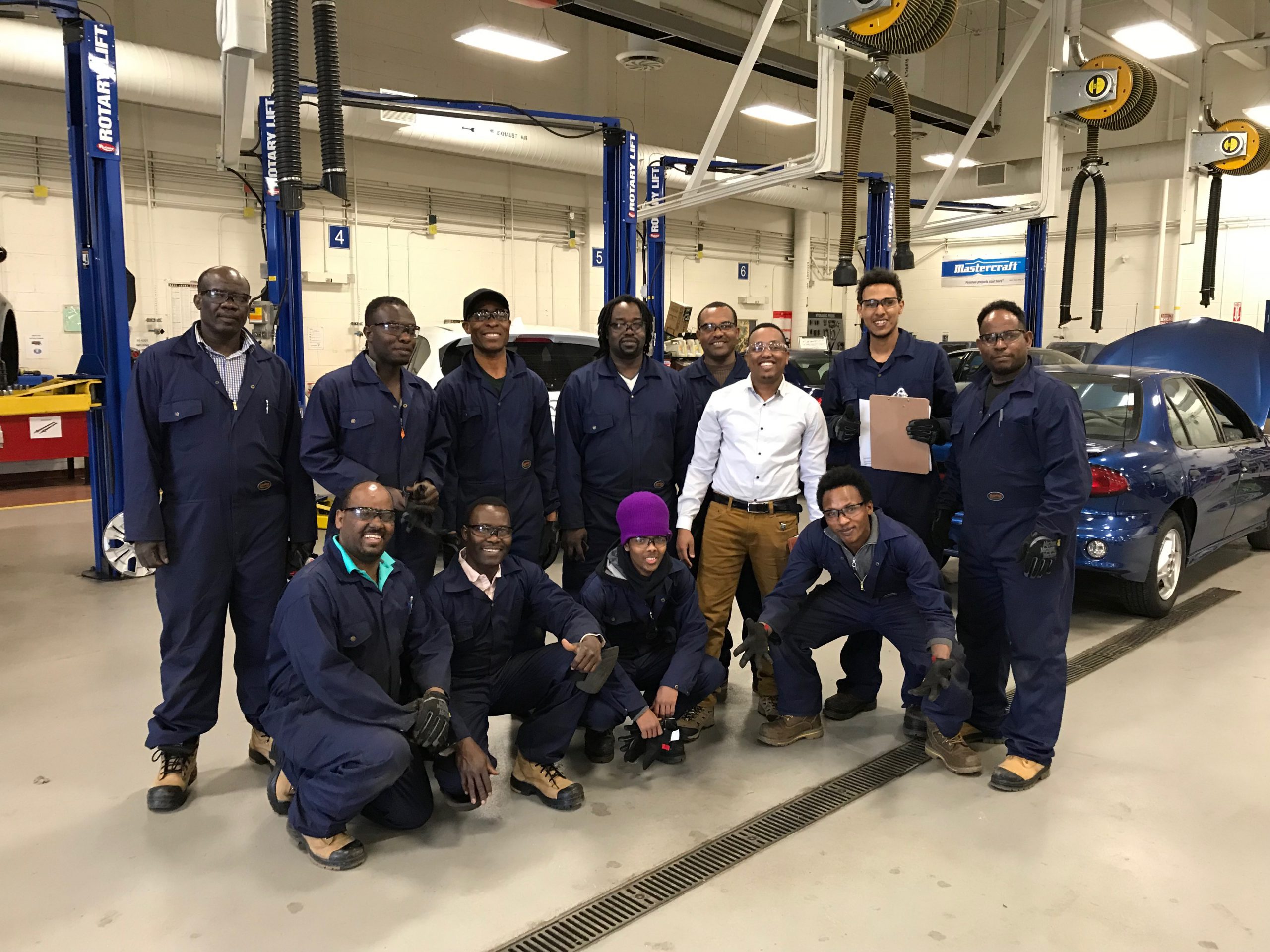Atlantic Canada has just extended its Atlantic Immigration Pilot program by two years, placing an emphasis on the skills new Canadians bring to the region. Supporting them along the way are education programs like NSCC’s automotive installation program which is helping people launch new careers and new beginnings.

When he stepped up to the podium to accept his automotive installation certificate of completion from Nova Scotia Community College (NSCC), it’s doubtful Patrick Soumaro ever imagined himself finishing a college program, let alone one in Canada.
That’s because Soumaro, 39, had spent the previous 26 years of his life living in an Ivory Coast refugee camp after fleeing for his life at the age of 13 when civil war broke out in his native Liberia.
His father had been killed, he himself had been injured and separated from the rest of his family. On top of that the youngster never had any formal schooling due to the civil unrest that displaced him.
While living in the refugee camp, however, he managed to acquire seven years’ informal training, observing at first, then gradually participating, in automotive work in a friend’s garage.
“I tried to follow friends in the garage; it was really street training,” he says. “They used to do body work, rust work, wiring.”
That experience proved invaluable when he was offered a spot in the automotive installation program through Immigrant Services Association of Nova Scotia (ISANS).
First introduced in 2016, the course includes fundamentals in safety standards, PPE, sector-specific terminology, car maintenance, hoist operation, tires and other things they’d see on a regular basis while working in a shop, says NCSS’s Transportation Department Facilitator Dave Giles.
“A lot of emphasis is placed on tires,” says Giles. “That’s a big part of what they’ll be doing.”
So students familiarize themselves with size, depth, torc among other variables.” After that students are split into two, where they actually get to experience driving the car into the shop. And working on hoists.
“Some get it quick while others struggle. They have to do it right. We’re all about perfection,” says Giles.
Auto installers aren’t part of the regulated trades. The course instructs them in tasks like oil and tire changes, accessories, exhaust and other variables that don’t require
licensing.
“Tire shops and places like Mr. Lube don’t require licensed personnel, so they can sell, repair, balance, install and other tasks so long as they’re not trade-regulated,” says Giles.
Introducing ISANS
And that provides a good entry point into the Canadian market place for many new Canadians says Mohja Alia, employment services manager with ISANS.
The non-profit agency offers settlement services, including language training, form filling and bridging programs to dozens of new Canadians landing in Nova Scotia every year. In response to labour market demand, three courses were identified by ISANS and subcontracted out to NSCC: construction, food industry and automotive installer, says Alia.
“They are very successful programs,” she says. “Many people get jobs very quickly.”
She says some clients arrive in Canada with automotive experience in their home countries already under their belt.
“That’s been very helpful in getting clients started with an apprenticeship.”
Some of the more entrepreneurial clients simply move through the program and strike out on their own.
“We had someone start their own tire changing business,” says Alia. “We try to support business start-up.”
Can’t Go It Alone
Immigration has long been sought out as a solution for a widening skills gap across multiple Canadian industry sectors—including transportation–and a new report by The Conference Board of Canada, published in May re-emphasizes this.
Titled Can’t Go It Alone: Immigration is Key to Canada’s Growth Strategy, the study considers a variety of labour force scenarios over the years 2018 to 2040 before arriving at its conclusion.
During this two-decade period, 9.2 million baby boomers are expected to reach retirement age in tandem with a parallel increase in demand on publicly-funded social services.
With a projected 11.8 million students graduating Canadian schools during that period, there will still be a shortfall left by the 13.4 million workers expected to retire or leave the labour force at that time.
The study concluded that a combination of gradually rising immigration levels and increased labour force participation of women, Indigenous peoples and persons with disabilities was the “best path forward” for Canada and would produce a net labour force increase of 5.9 million workers.
It’s worth noting that many of the 11.8 million Canadians who will be leaving school and entering the workforce between 2018 and 2040 will be the sons and daughters of immigrants. These individuals become important contributors to the Canadian labour market, which in turn helps the country’s economic performance.
Indeed, while the future anticipates the value new Canadians bring to the table, Atlantic Canada still struggles with attracting and retaining new Canadians today.
Case in point: according to an excellent series of articles, The Saltwater Deep Dives, in the Chronicle Herald earlier this year, there was a record 19,300 immigrants that entered the region’s workforce, between 2012-2018.
However, that wasn’t enough to offset a 2.4 per cent decline — 30,700 people — in the labour market, mostly because of retiring baby boomers.
Adding further frustration to the situation is the region’s track record for keeping immigrants in the area. Stats range from a high of 72 percent in Nova Scotia to a mere 18 percent in PEI.
The Atlantic Immigration Pilot
In response, strategies are needed to address this issue. One of them, the three-year The Atlantic Immigration Pilot (AIP) program was launched in 2017 and recently extended to December 2021.

According to a press release from the Atlantic Canada Opportunities Agency, AIP “is an innovative partnership aimed at attracting and retaining skilled immigrants and international graduates to meet the unique workforce needs of the Atlantic region. The goal is to ensure the long-term retention and integration of newcomers in Atlantic Canada to help drive economic growth.
AIP is employer-driven. Most immigration programs begin with someone applying to immigrate to Canada. Under AIP, Atlantic employers (such as businesses, not-for- profits, governments) apply to a province to become designated under the pilot. This means they can offer jobs to skilled foreign workers and recent international graduates. These jobs must be in the province where the employer is designated and for every job offer, employers have to demonstrate that local workers haven’t been able to fill the void.
The province where the candidate will work must endorse the job offer. After the endorsement, the candidate can apply for permanent resident status. The candidate can live and work in Canada when the application is approved.
AIP has three programs divided by skill levels, each of which have multiple steps that need to be completed in full: High-skilled, intermediate-skilled and an international graduate program.
Candidates need to have accumulated at least 1,560 paid hours over the past three years. Internships, volunteering and self-employment aren’t considered valid, however those hours can be accumulated both inside and outside Canada.
Furthermore, work experience can be used to qualify for the intermediate skilled work program in a two ways, including experience that matches National Occupation Classification skill level, C, which includes job-specific training like long-haul truck drivers.
Language and education qualifications must also be assessed and applicants must have enough money to support themselves among other variables.
A job offer must be received from a designated employer using a specific form. It has to be permanent, full-time (30+ hours weekly) and can’t be seasonal.
Finally, the employer and employee submit the application form once all the steps have been completed.
Through the pilot, more than 2,535 approved permanent residents are destined for or already in Atlantic Canada.
As of May 2019, AIP is allowing immigrant spouses with intermediate skill level, such as food and beverage servers or long-haul truck drivers, an opportunity to apply for an open work permit.
This change supports the Atlantic Immigration Pilot’s goal to ensure newcomers who arrive in Atlantic Canada, remain.
AIP is part of The Atlantic Growth Strategy’s objective is to drive long-term economic growth in the Atlantic region by implementing targeted, evidence-based actions under the following priority areas, innovation, trade and investment, infrastructure and climate change.
Final Thoughts
Patrick Soumaro is happy. He’s just achieved level 4 English the week of our interview.
He’s made a conscious decision to put his job search on hold so he can focus on hiscEnglish studies. It’s a short term achievement acquired as part of a longer-term plan.
During his automotive installation course studies, English was perhaps the most daunting part of his course. Learners are required to use a computer to research parts and costs.
ISANS recognizes that language can be a barrier and supplies interpreters on an as-needed basis to help facilitate student learning.
“For some work you need to have education and skills,” he says. “I want to be a mechanic or do auto body work…I want to be in the automotive sector.”
To date 48 students have graduated the automotive installation progam, says Dave Giles.
“The employment rate is pretty good. At the end of the day students are provided with an introduction to Canadian culture. They learn about what employers expect. Some students go on to other industries, some enroll in further automotive studies…some even open their own shops.”
“Shop owners should know that there’s entry-level people out there willing to do the work. There’s wage subsidies and lots of support available if shop owners take on a student.
“It’s a good program and allows the opportunity that might not have been available in students’ home countries, whereas here it’s seen as a profession. They’re privileged to have the chance to take this program.”
Trades Practical Assessment Program
Employers: Are you interested in hosting an experienced immigrant trades-person for 12 weeks at no cost?
The Trades Practical Assessment Program connects employers across Nova Scotia with experienced tradespeople. As a host employer, you offer the chance to work in your organization for up to 12-weeks at no cost to you. There is no obligation to hire; you have the opportunity to assess their skills on the job and provide recommendations on apprenticeship and exam level readiness.
Participants are keen to participate – they gain valuable Canadian work experience, local references, experience towards their level or Red Seal and the opportunity to network and showcase their skills. All participants have a minimum of 2 years’ experience in their trades, are certified in WHMIS, Fire Safety and First Aid, and are job ready and legally eligible to work in Canada.
What are the benefits to you?
- Flexible: Participants are flexible and can start with entry-level tasks
- Low Risk: Tradespersons are insured against injury at the workplace through ISANS
- Targeted: Individual skills are matched with employer needs
- Career-Focused: Tradespersons are connected to the Nova Scotia Apprenticeship Agency and eager to become certified in their trades
- No Strings Attached: No obligation to hire or pay – allowance covered by ISANS
For more information please contact Mai Al Nabhan | 902-406-8846 | malnabhan@isans.ca
Community Agencies Supporting New Canadians Immigrant Services Association of Nova Scotia
6960 Mumford Road, Suite 2120 (2nd floor)
Halifax, Nova Scotia, B3L 4P1
Phone: 902-423-3607
info@isans.ca
PEI Association for Newcomers to Canada
49 Water St.
Charlottetown, Prince Edward Island, C1A 1A3
Phone: 902-628-6009
Association for New Canadians
144 Military Road
St. John’s, Newfoundland and Labrador
Phone: 709-722-9680
settlement@nfld.net
YMCA of Greater Saint John
191 Churchill Boulevard
Saint John, New Brunswick, E2K 3E2
Phone: 506-634-4860
newcomerconnections@saintjohnY.com
Multicultural Association of Fredericton
28 Saunders St.
Fredericton, New Brunswick, E3B 1N1
Phone: 506-454-8292
mmcaf@mcaf.nb.ca
Multicultural Association of the Greater Moncton Area
22 Church St., Suite C170
Moncton, New Brunswick, EIC 0P7
Phone: 506-858-9659
info@magma-amgm.org

